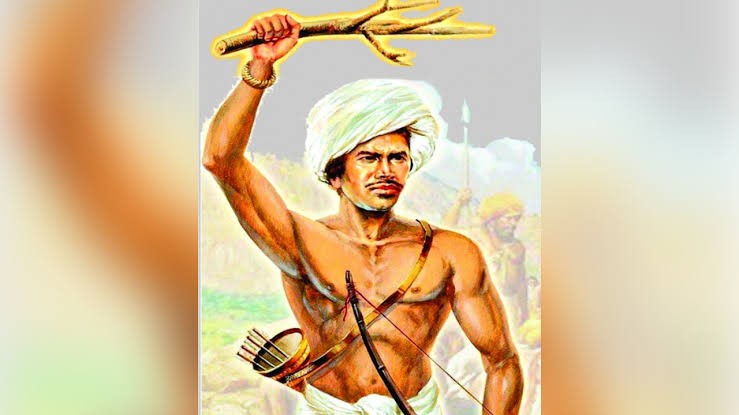Description

Disclaimer: Copyright infringement not intended.
Context
- Prime Minister Modi announced he will go to the native village of their icon Birsa Munda on his birth anniversary and launch a welfare scheme for the tribal community.
- Bhawan Birsa Munda's birth anniversary falls on November 15 which is celebrated as 'Janjatiya Gaurav Divas' (Tribal Pride Day).
Details
Early Life and Background
- Birth: Birsa Munda was born on November 15, 1875, in Ulihatu, a tribal village in modern-day Jharkhand, India.
- Tribal Identity: He belonged to the Munda tribe, one of the indigenous Adivasi communities in the Chhotanagpur plateau.
- Cultural Exposure: Birsa grew up amidst the tribal traditions, customs, and folklore, deeply connected to the cultural ethos of his community.
- Influence of Revolts: Witnessing the exploitation by British colonizers and local landlords, Birsa developed a fervent desire to resist oppressive policies and fight for the rights of his people.

Leadership and Revolt
- Emergence as a Leader: Birsa Munda emerged as a charismatic leader and led several tribal uprisings against British colonialism and the exploitative zamindari system.
- Revolt for Land Rights: His movement aimed to reclaim tribal lands from landlords and restore the rights of the indigenous population.
Millenarian Movement and Reforms
- Birsaism: Birsa initiated a socio-religious movement, Birsaism, advocating for socio-economic reforms and cultural rejuvenation among the tribal communities.
- Religious Syncretism: He preached a blend of tribal animism and elements of Christianity, advocating for social equality, cultural revival, and a rejection of oppressive social practices.
- Leadership and Resistance: He emerged as a prominent tribal leader, known as "Dharti Aaba" (Father of Earth), leading the tribal community against British colonial rule and oppressive policies.
- He urged Mundas to give up harmful practices like alcohol consumption, promote cleanliness in villages, and abandon superstitions.
Munda Rebellion (Ulgulan)
Causes and Objectives
- Issues Faced: The rebellion was a response to British land policies that threatened traditional land systems, exploitation by Hindu landlords, and criticism of tribal culture by missionaries.
- Objective: Birsa aimed to establish "Munda Raj" by expelling the British and outsiders from tribal lands.
Symbolism and Actions
- Symbolic Resistance: Using traditional symbols and language, Birsa urged people to defy the "dikus" (outsiders) and establish a kingdom under his leadership.
- Actions: Birsa's followers attacked symbols of colonial power such as police stations, churches, and property owned by moneylenders and zamindars.
Arrest and Legacy
- Arrest and Death: Birsa was arrested by the British in March 1900 and died of cholera in prison. His death marked the fading of the movement.
- Significance: The rebellion led to the introduction of laws protecting tribal land (Chotanagpur Tenancy Act, 1908) and highlighted tribal resistance against colonial oppression.
Legacy
- Symbol of Resistance: Birsa Munda became an icon of indigenous resistance, inspiring various tribal uprisings against colonial rule across India.
- Impact on National Movement: His efforts laid the groundwork for broader tribal movements and contributed to the larger struggle for independence.
- Cultural Revival: Birsa's teachings and reforms revitalized tribal identity, language, and cultural heritage, fostering a sense of pride and solidarity among indigenous communities.
- Legacy Among Tribes: He is venerated as a hero and a symbol of empowerment among various tribal groups, and his legacy remains deeply ingrained in the cultural fabric of Jharkhand.
- Jharkhand Foundation
- Jharkhand was created on November 15, 2000, by the Bihar Reorganization Act, coinciding with Birsa Munda's birth anniversary.
- "Jharkhand" translates to "The Land of Forests," signifying the region's dense forest cover.

Conclusion
Birsa Munda's legacy as a courageous leader, social reformer, and advocate for tribal rights reverberates through history, emphasizing the resilience and struggle of indigenous communities against colonial oppression. His efforts for socio-religious reforms and cultural resurgence continue to inspire and hold significance in the narrative of India's freedom struggle and tribal heritage.
|
PRACTICE QUESTION
Q. Birsa Munda's legacy as a courageous leader, social reformer, and advocate for tribal rights reverberates through history, emphasizing the resilience and struggle of indigenous communities against colonial oppression. Analyse. (250 words)
|







